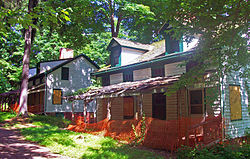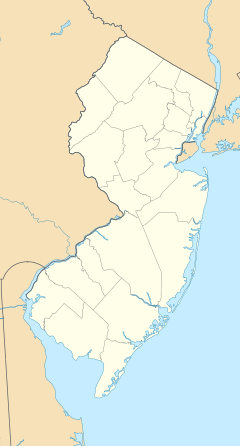- Feltville Historic District
-
Feltville Historic District
 East elevations of two remaining vacant houses, 2009
East elevations of two remaining vacant houses, 2009Location: Berkeley Heights, NJ Coordinates: 40°40′53″N 74°23′13″W / 40.68139°N 74.38694°WCoordinates: 40°40′53″N 74°23′13″W / 40.68139°N 74.38694°W Area: 130 acres (53 ha) Built: 1825-1882 Governing body: Union County Park Comissionr NRHP Reference#: 80002522 Added to NRHP: 1980 The Feltville Historic District, located in the Watchung Reservation, Union County, New Jersey, is a historical part of this area which still stands to this day. It includes eight houses, a church, a carriage house and a general house. Over the years this "deserted village of Feltville" has become a mill town, farming community, and a summer resort. Only three families remain in this village and this site is visited for people to learn the history of it or to enjoy the surroundings. In 1980 it was listed on the National Register of Historic Places.
Contents
History
The first settler of this area was Peter Willcox, an Englishman who moved here from Long Island about 1736. The area then was a frontier. He built a sawmill, but it was demolished as more people came to the area.
David Felt, a businessman in Boston, Massachusetts, in 1825 decided to move to New York City. By 1844, the production of his mill could not grow fast enough to meet the demands of the merchants he supplied. Therefore, Felt began to look for land in New Jersey on which to build a second factory and at last bought land from the descendants of Peter Willcox. In but two years, David Felt built a mill on Blue Brook, two dams for the mill, and a town for the workers in the mill. He named this new town “Feltville”. Within the little town, he as owner gained the nickname of "King David", for he obliged the residents to attend divine service in the churchhouse and their children to attend classes in a one-room schoolhouse.
By 1850, about 175 people lived in Feltville, often four families in each of the larger houses and two in each of the smaller. After fifteen years, "King David" Felt sold the property and several successor businesses failed, the place becoming known as "the deserted village". In 1882, it was bought by Warren Ackerman, who transformed it to a summer resort called Glenside Park. Interest soon dwindled as more people chose to summer on the shore of New Jersey instead. After the place was again deserted, the Union Country Park Commission bought it and included it in the Watchung Reservation, renting the houses to families. The houses were stabilized recently, and now an attempt is underway restore what was a carriage house and convert it to a school lecture hall.
Many of the main structures have been torn down, so preserving the buildings that still stand is essential if the visitor is to see how the inhabitants of Feltville-Glenside Park once lived. The main missing buildings are the mill, the Felt Mansion, the dormitories, and the school. The foundation of the mill, which is the whole importance of building this village still stands today. Preserving these structures allows the history of Feltville-Glenside Park to remain an important part of the visible heritage of New Jersey.[1]
Tourist attractions
County staff also provides activities on certain weekends where they have children’s games, a demonstration of apple cider pressing, and a display of archaeological artifacts.
During the month of October, two weeks before Halloween, there are haunted hayrides for families. They ride through this town, explaining the noted people throughout this town’s history and of course adding special effects.
This is open to the public daily and there is a visitor center where brochures are given.
Rumors of ghosts
It has been a widely held belief that three ghosts live in the house furthest down the path. The rumor originated in 1912, when three young sisters all went camping deep in the woods, yet did not return. Locals were only able to find their bonnets, and the fears of the people caused almost half of the residents to move away. Those that remained never let their children go deep in the woods again without supervision, and a town ordinance now prohibits camping beyond the scope of the houses without the appropriate permits.
References
- Union County, NJ- Parks. Union County. Retrieved 2008-04-20
- Mountainside History. Mountainside Public Library. Retrieved 2008-04-20
External links
U.S. National Register of Historic Places Topics Lists by states Alabama • Alaska • Arizona • Arkansas • California • Colorado • Connecticut • Delaware • Florida • Georgia • Hawaii • Idaho • Illinois • Indiana • Iowa • Kansas • Kentucky • Louisiana • Maine • Maryland • Massachusetts • Michigan • Minnesota • Mississippi • Missouri • Montana • Nebraska • Nevada • New Hampshire • New Jersey • New Mexico • New York • North Carolina • North Dakota • Ohio • Oklahoma • Oregon • Pennsylvania • Rhode Island • South Carolina • South Dakota • Tennessee • Texas • Utah • Vermont • Virginia • Washington • West Virginia • Wisconsin • WyomingLists by territories Lists by associated states Other Categories:- Historic districts in New Jersey
- Ghost towns in New Jersey
- National Register of Historic Places in New Jersey
- Geography of Union County, New Jersey
- Watchung Mountains
Wikimedia Foundation. 2010.

